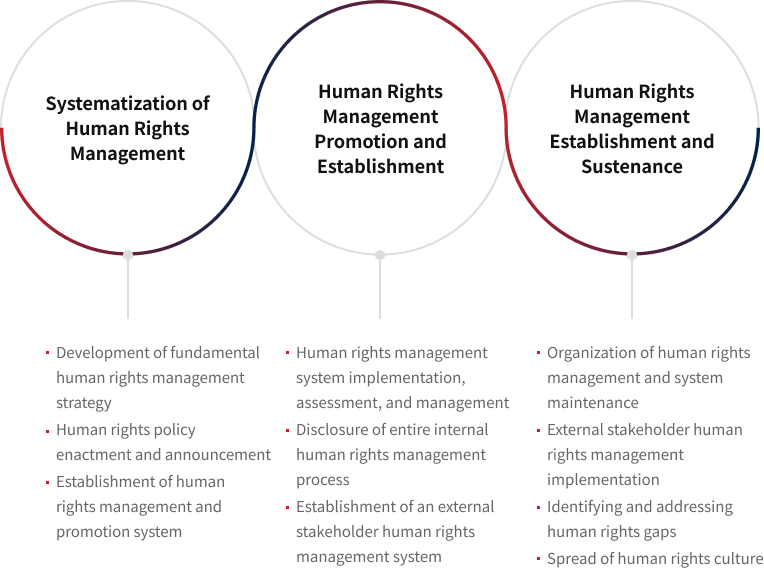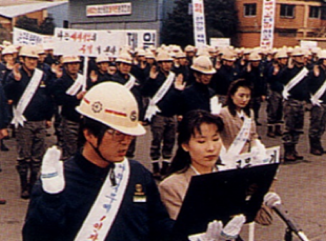Human Rights Management




Dongkuk Steel strives to conduct human rights-friendly management by implementing human rights management policies, avoid human rights abuses, and mitigate risks that may arise during company operations. Dongkuk Steel adheres to the Universal Declaration of Human Rights, the UN Guiding Principles on Business and Human Rights, and the International Labor Organization's Declaration on the Fundamental Principles and Rights at Work, as well as other international human rights/labor standards and guidelines.
Dongkuk Steel has developed human rights management governance to systematically implement human rights management. The top decision-making organization, the “ESG Committee,” acts as a review/strategy advisor and decision-making entity of significant ESG-related issues such as human rights. Furthermore, the “ESG Planning Team,” a working-level department, is responsible for (a) human rights policy enactment/revision management; (b) human rights action plan development; (c) human rights risk management; and (d) human rights education.
This human rights management policy applies to Dongkuk Steel's executives and employees. Dongkuk Steel's executives and employees shall follow this policy in their commercial dealings with partners and suppliers and shall encourage other stakeholders to comply with the policy.
A. Non-discrimination
In terms of employment, promotion, education, wages, and welfare benefits, Dongkuk Steel shall not discriminate on the basis of gender, race, nationality, age, educational background, religion, disability, marital status, gender identity, or any other factor.
B. Guaranteed freedom of association and the right to collective bargaining
Dongkuk Steel shall respect the freedom of association and the right to collective bargaining pursuant to labor-related laws and regulations and shall foster an atmosphere in which employees may interact with management regarding working conditions.
C. Prohibition of forced labor
Dongkuk Steel shall not commit acts such as mental/physical harm, mandatory overtime work, or forced labor using debt as collateral.
D. Guaranteed industrial safety
Dongkuk Steel shall thoroughly adhere to the health and safety standards mandated by laws and regulations of the state and region, ensuring that employees work in a safe environment.
E. Workplace harassment prevention
Dongkuk Steel shall value its executives and employees and prohibit any kind of mental/physical harassment, including verbal abuse, sexual harassment, and physical abuse.
F. Prohibition of child labor
Dongkuk Steel shall adhere to the minimum employment age established by laws and regulations of the state and region.
G. Protection of local residents' human rights
Dongkuk Steel shall manage to guarantee that local residents' human rights are not infringed as a result of management activities, listen to local community's opinions, and incorporate them into corporate management.
H. Customer human rights protection
Dongkuk Steel shall ensure product safety and comply with laws and regulations to safeguard customers' various rights and interests.
Dongkuk Steel shall develop a human rights risk management process to protect the human rights of all executives and employees and to prevent and reduce risks. The results shall be disclosed to stakeholders through sustainability reports.

Dongkuk Steel shall undertake a human rights impact assessment to identify human rights concerns that correspond to the core principles outlined above and develop improvement tasks appropriately. The outcomes of the human rights impact assessment shall be monitored and disclosed to stakeholders.
Dongkuk Steel shall operate a grievance management system for stakeholders as a human rights relief process. Issues reported through various online/offline reporting channels shall be handled in accordance with this process to ensure timely and reasonable resolution. Furthermore, the safety of the whistle-blower and the victim shall be considered as priority during this process.

A. Inquiries about Human Rights Policy (ESG Planning Team): esg@dongkuk.com (+82-2-2222-0052)
B. Human rights reporting
1) Ethical management reporting center
[Web] www.dongkuk.com/ko/csr/report [MMS] 1666-1954
[Mail] Ethics Management Team, 12F, 19 Euljiro 5-gil, Jung-gu, Seoul (Postal code 04539)
2) Grievance Management System (Intranet): http://niris.dongkuk.com/distress.page
3) Grievance Counselor (HR Team): wonjong.cho@dongkuk.com (+82-2-317-1453)
4)) Others: Labor unions, HR managers (management teams) at each business site, and department heads




